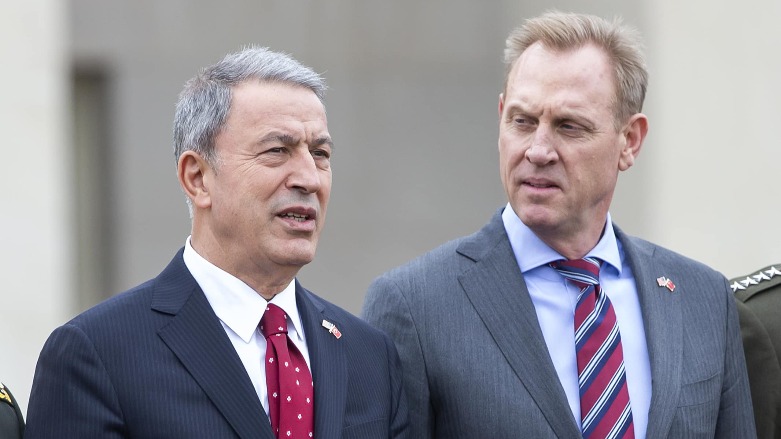Strongest US warning yet to Turkey on S-400

WASHINGTON DC (Kurdistan 24) - The Pentagon has made clear its uncompromising opposition to Turkey’s acquisition of the advanced Russian missile defense system, the S-400.
On Thursday, Acting Secretary of Defense Patrick Shanahan wrote a letter to his Turkish counterpart Hulusi Akar, stating that if Turkey proceeded to take delivery of the S-400, “Turkey will not receive the F-35,” America’s most advanced fighter jet.
Shanahan gave Ankara a deadline of July 31 to cancel the deal.
Yet, the following day, as Shanahan’s message became public knowledge, the head of Rostec, Russia’s state defense corporation, said that Moscow “would begin delivery of the S-400s to Turkey within two months.”
Turkey has invested over $1 billion to help produce the jet-fighter. It was to make 937 parts, including the landing gear and a large portion of the plane’s center fuselage, Ellen Lord, US Under Secretary of Defense for Acquisition and Sustainment, told reporters on Friday.
That investment will be forfeited if Turkey is dropped from the F-35 program.
Shanahan’s letter to Akar revealed that the two defense chiefs had spoken by telephone on May 28. Shanahan told Akar, “If Turkey procures the S-400,” then “our two countries must develop a plan to discontinue Turkey’s participation in the F-35 program.”
The following day, as is now evident, Turkish President Recep Tayyip Erdogan called US President Donald Trump, in an apparent attempt to get Trump to overrule Shanahan.
Later that day, Turkish authorities freed a Turkish-American physicist, Serkan Golge, a NASA scientist convicted and jailed on the dubious charge that he was involved in the 2016 coup attempt. Trump publicly thanked Erdogan for Golge’s release.
It was also announced that Trump and Erdogan would meet on the sidelines of the G-20 summit in Tokyo at the end of the month.
In that context, as it appeared that the two presidents had had a cordial discussion, Turkish sources put out the claim that Trump had also agreed to Erdogan’s request to establish a working group on the S-400, as if the US might still be open to Turkey’s acquisition of the Russian missile system.
The London-based Middle East Eye was the first to report that story, and it was followed by the Turkish press and even by Bloomberg News.
Read More: US Position on S-400 has not changed, contrary to Turkish claims
However, it simply was not true. As Dr. Aykan Erdemir, a former Turkish parliamentarian and currently a Senior Fellow at the Foundation for Defense of Democracies, told Kurdistan 24, “Lately, there has been a systematic attempt by the Turkish government to leak misinformation to downplay” the differences between Washington and Ankara.
It is “driven to a large extent by Erdogan’s desperate need to sustain Turkey’s flailing economy until the June 23 rerun of Istanbul’s mayoral election,” Erdemir explained.
Shanahan also warned Akar of other consequences for Turkey, if it proceeds with the S-400.

A 2017 US law—Countering America’s Adversaries Through Sanctions Act (CAATSA)—provides for imposing sanctions, when, among other things, countries purchase weapons from Russia.
“There is strong bipartisan US Congressional determination to see CAATSA sanctions imposed on Turkey if Turkey acquires the S-400,” Shanahan wrote Akar.
Shanahan also warned that acquiring the S-400 “will hinder” Turkey’s “ability to enhance or maintain cooperation with the United States and within NATO.”
It will “lead to Turkish strategic and economic over-dependence on Russia,” while “undermining Turkey’s defense industry” and its “ambitious economic development goals,” he wrote.
“President Trump committed to boost bilateral trade from $20 billion currently to more than $75 billion,” Shanahan added, but “that may be challenging if the United States imposes CAATSA sanctions.”
Turkish officials have given no indication they are considering altering their plans, while Turkish forces are already receiving instruction in Russia on operating the missile system.
“When Turkey started training on the S-400 in Russia, that was a signal that we needed to take action as well and show that we were serious,” Andrew Winternitz, Acting Deputy Assistant Secretary of Defense for European and NATO Policy, told reporters on Friday.
Already on May 7, the Russian news agency TASS reported “around 100 Turkish servicemen” would start training on the S-400 at the end of May.
Editing by Nadia Riva
